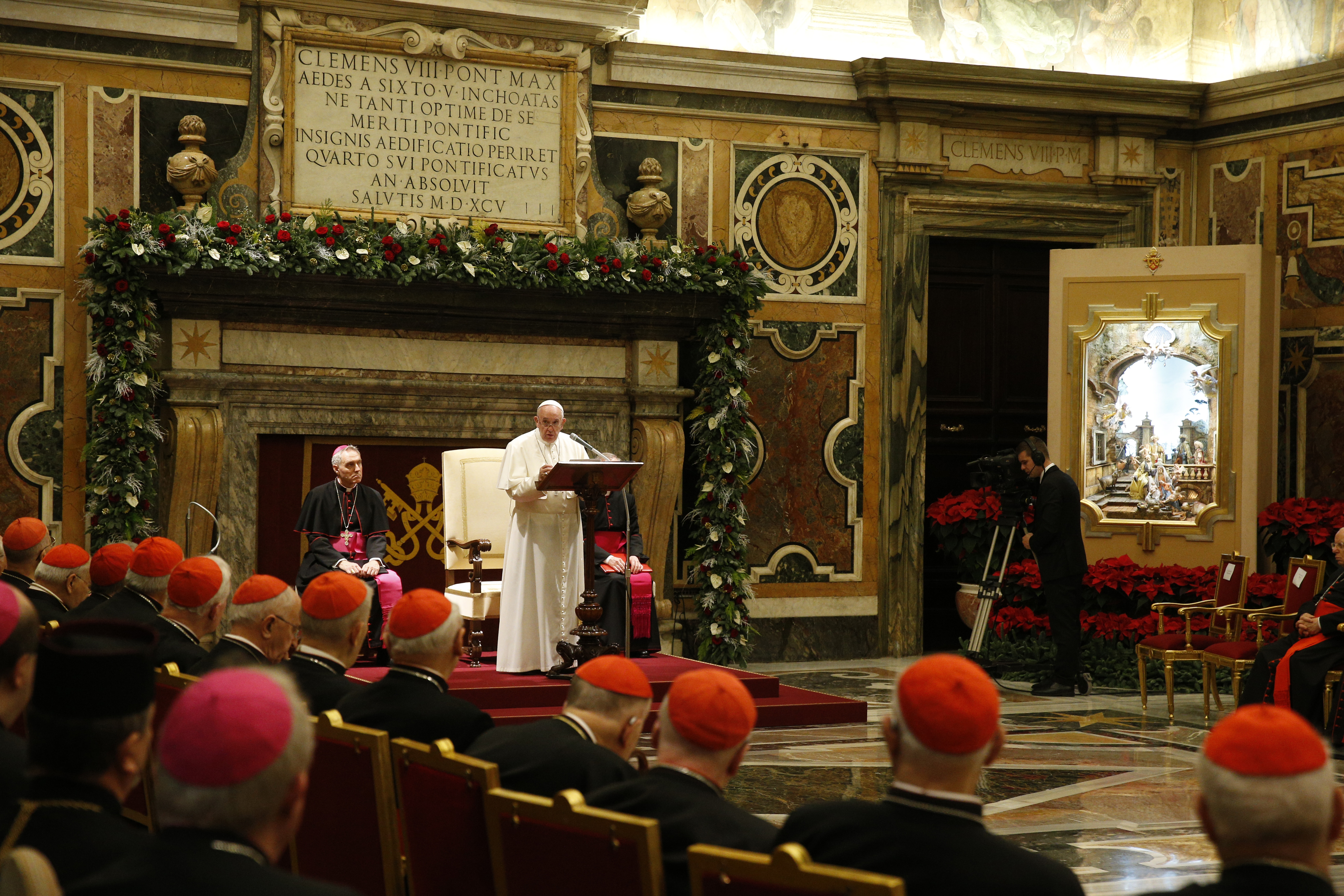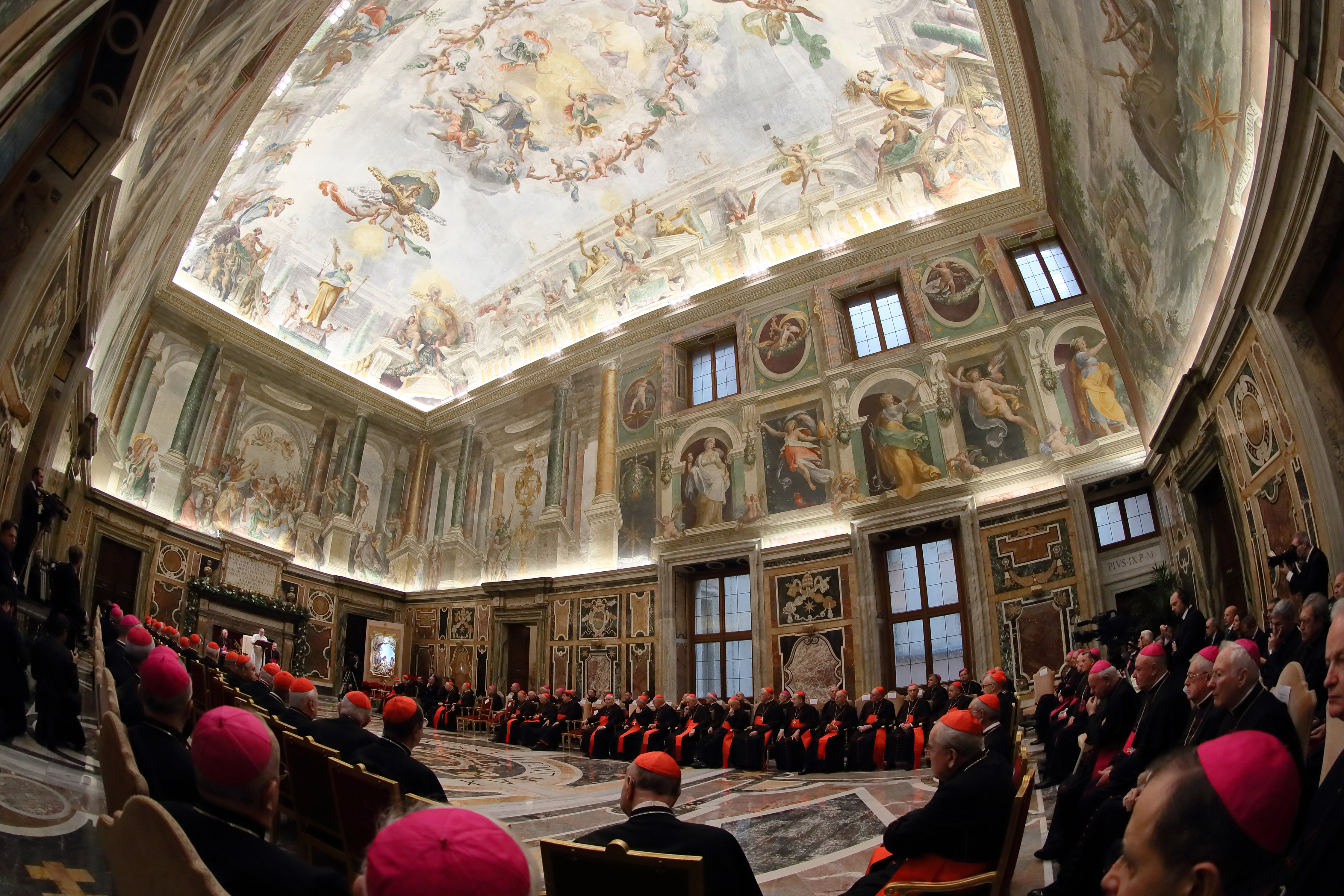As 2019 draws to a close, and the seventh anniversary of his pontificate fast approaches, Pope Francis is putting his foot on the accelerator as he presses ahead with Church reforms.
The Pope revealed the shift in gear during his Christmas address to the Roman Curia, an annual event where he is known for giving blunt, and sometimes brutal, diagnoses of the spiritual illnesses suffered by the Church’s head office.
This year, the 83-year-old Pope did something different. He synthesised the question facing the Church in the early 21st century: how to evangelise a rapidly changing world where faith is so often forgotten.
“Brothers and sisters, Christendom no longer exists,” Francis told the cardinals, archbishops and clergy officials gathered in the frescoed Sala Clementina, inside the Apostolic Palace.
“Today we are no longer the only ones who create culture, nor are we in the forefront of those most listened to.”
The world is not simply experiencing an “an epoch of changes”, the Pope stressed, but “an epochal change”, meaning the Church cannot sit back and maintain the status quo.
So what does this mean? Two points can be drawn from the speech.
The first is how reform takes place in a 2,000-year institution where cosmetic changes or “change for change’s sake” is never going to work.
Rather than propose readymade solutions, the Pope is trying to ask the right questions, point out the temptations and remind the Church that being sensitive to the past does not mean becoming stuck in it. Catholic tradition is not a museum piece; it is ever-evolving and ever-growing.
“Appealing to memory is not the same as being anchored in self-preservation, but instead to evoke the life and vitality of an ongoing process. Memory is not static, but dynamic,” the Pope said. “By its very nature, it implies movement. Nor is tradition static; it too is dynamic, as that great man [Gustav Mahler] used to say: tradition is the guarantee of the future and not a container of ashes.”
In his curia address, Francis drew inspiration from two prophetic Christian thinkers of the 19th and 20th centuries: the English saint, St John Henry Newman – who the Pope canonised in October – and Cardinal Carlo Maria Martini, the late Archbishop of Milan.
Francis cited Newman’s line that “to live is to change, and to be perfect is to have changed often,” saying it was a reminder that “development and growth are a normal part of human life, even as believers we know that God remains the unchanging centre of all things.”
At the end of his speech, he quoted Cardinal Martini’s 2012 interview, given just months before the Jesuit priest died. The Pope cited the cardinal’s assessment that “the Church is two hundred years behind the times.”
Cardinal Martini also said in that interview that “our culture has become old, our churches and our religious houses are big and empty, the bureaucratic apparatus of the Church grows, our rites and our dress are pompous”. He dreamed of a prophetic Church, with people who “burn in such a way that the Spirit can spread itself everywhere”. Although he died before Francis’ election, the cardinal foretold the 2013 conclave.
The Pope wants a Church which can “read the signs of the times with the eyes of faith” and make the necessary reforms, in continuity with tradition. It means avoiding the temptations to rigidity or making exterior reforms which give the appearance of change.
Rigidity, the Pope argued, “ends up erecting fences and obstacles on the terrain of the common good, turning it into a minefield of incomprehension and hatred” adding that “behind every form of rigidity lies some kind of imbalance”. It is a spiritual illness which he has repeatedly railed against.
Francis also warned against a phenomenon found in the Italian novel “The Leopard” written by Giuseppe Tomasi di Lampedusa, which includes the line: “if we want everything to stay the same, then everything has to change.” It is a temptation some have succumbed to in the Roman Curia and can be found in any civil service machinery: follow the minister’s orders but only in order to keep things exactly as they are. It is all about preserving power.
This brings us to the second important takeaway from Francis’ Christmas address. The old guard of the Roman Curia is being shown the exit.
As the Pope started his speech he announced that Cardinal Angelo Sodano, the Dean of the College of Cardinals, would be retiring at the age of 92. Cardinal Sodano has been one of the most powerful figures in the Vatican, serving as Secretary of State from 1991-2006 and later as dean, which gave him an influential position during a papal conclave. Cardinal Sodano has long been accused of mishandling sex abuse cases and of embodying a clerical culture where defence of the institution comes first. Francis has ruled that whoever serves as the Dean of the College of Cardinals does so for a five year period, rather than as a job for life.
Next year, the Pope is due to publish a new apostolic constitution for the Roman Curia ensuring that it is focussed on evangelisation and serving local churches. One of the changes is a merger between the Congregation for the Evangelisation of Peoples (Propaganda Fide), focussed on mission territories in the developing world, and the Pontifical Council for Promoting the New Evangelisation. Francis also referred to the Congregation for the Doctrine of the Faith as having an evangelising role.
Francis said that Propaganda Fide and the Doctrine department had been set up at a time when there was “a Christian world and a world yet to be evangelised”.
He explained: ‘That situation no longer exists today. People who have not yet received the Gospel message do not live only in non-Western continents; they live everywhere, particularly in vast urban concentrations that call for a specific pastoral outreach.”
The Roman Curia, in other words, is not a self-perpetuating bureaucracy seeking to preserve its own institutional status and power. For Francis, it is time for the curia to take a central part in the evangelising mission of the Church.
Given it was just days before Christmas, the Pope was keen to offer encouragement. He stressed the reform is not happening “as if nothing had preceded it. On the contrary, an effort was made to enhance the good elements deriving from the complex history of the curia.”
He wants those in the Church, whether they are curial cardinals or ordinary believers, to draw inspiration from the simple message of the Gospel, and the conversion this entails.
Using words from Newman, the Pope prayed with his senior officials: “May each Christmas, as it comes, find us more and more like Him, who at this time became a little child for our sake, more simple-minded, more humble, more holy, more affectionate, more resigned, more happy, more full of God.”



 Loading ...
Loading ...